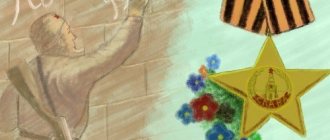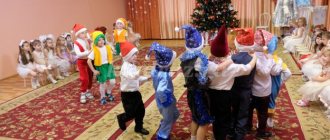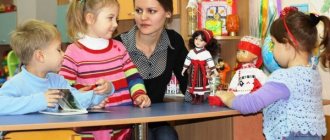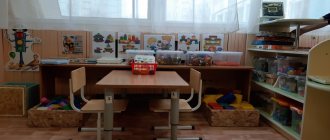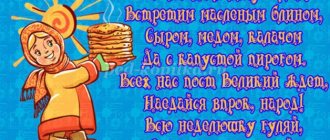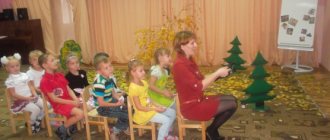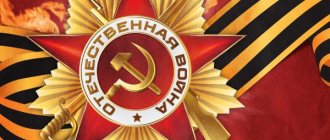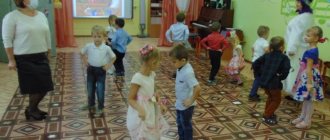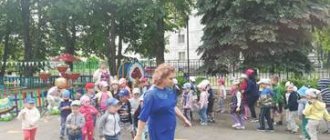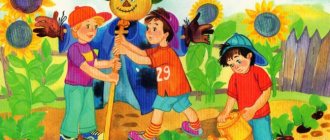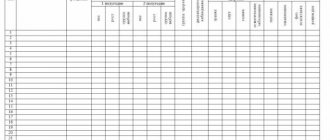What does preparation for the matinee include?
The purpose of the Victory Day matinee is the same for preschoolers of all groups and is to instill respect and pride for the heroism and courage of the people who fought against fascism.
To develop a festive event, the teacher needs:
- determine the objectives of its implementation, taking into account the age of the pupils;
- choose the form of organizing the matinee;
- fill the form with content, that is, come up with a plot, distributing roles and words between children;
- choose music and scenery to suit the plot idea;
- decorate the hall where the event will be held.
The objectives determine the choice of form and the nature of the content of the matinee.
For any age group, the scenario can be implemented in the form of a greeting card or a holiday concert for a veteran: a combat veteran is invited to the holiday, in whose honor the children sing, recite and play.
In addition to instilling patriotic feelings, the Victory Day matinee, like other similar events, is a way to demonstrate the creative potential of children
Table: tasks and suitable forms of scenario implementation
| Group | Tasks | Scenario implementation form |
| Second youngest |
| A literary and musical composition with the performance of one military song (usually to the “plus”), recitation of poems (well-spoken children are involved), one or two dances, didactic and outdoor games on the topic (parents can get involved). The role of the leader is performed by the teacher. The matinee lasts 30 minutes. |
| Average |
| A literary and musical composition, also with recitation, dancing (for example, one general and two in groups) and the performance of one or two songs. In this case, the script can include a costume dramatization of a poem or an excerpt from prose. The plot of the matinee has a more complex composition: there is a beginning situation, development of action, climax (for example, theatricalization), and denouement. The leading roles remain for the children (one or two couples). The event lasts 40 minutes. |
| Older |
| The emphasis in the literary and musical composition is on the literary component, which includes children's stories about relatives who participated in the Second World War. The scenario can be based on a theatrical performance on the topic with poems (2/3 of the group is involved in recitation) and dances (one or two general and two group). The duration of the event is 60 minutes. |
| Preparatory |
In the first junior group there is no matinee for Victory Day. But the day before the teacher talks about the existence of such an important holiday for every person in the city and country. This can be done in the form of an excursion to the monument to those killed in the Second World War, a presentation with 3-4 slides showing photographs of soldiers, military vehicles, and the 1945 Victory Parade. The show should be accompanied by appropriate music.
Usually, preparations for the Victory Day matinee begin a month before the event.
Who to invite to the party
Of course, not a single kindergarten holiday is complete without the participation of parents. It is worth inviting grandparents to a celebration called “Victory Day” in kindergarten. They will sincerely rejoice at the success of their grandson or granddaughter, and the holiday will awaken in their soul memories of difficult war or difficult post-war times.
The children usually very diligently make invitation cards on a given topic, and the teacher signs them, specifying the time of the event. Not a single purchased postcard can replace a postcard made by children's hands, because they are filled with love and warmth of a pure soul.
Development of a matinee script
When developing a script for a matinee, it is important to choose a non-trivial plot outline, that is, a literary component, as well as suitable music and dance accompaniment.
Songs and dances for the matinee
The festive event must have musical and choreographic design. It is this that gives the matinee solemnity. The most popular military songs for matinee can be found here or in this selection.
Texts for younger and middle groups should not be taken in their entirety, but one verse-chorus. Musical accompaniment, as well as useful audio materials (Yu. Levitan's announcement of the beginning of the war, the surrender of Germany, etc.) can be found here.
Taking into account the age of the children of the second junior group, dancing and learning songs are planned in advance, a month before the matinee. Rehearsals are usually organized during a music class. If the speech development of the children allows, the song can be performed to the accompaniment of a music director.
In the middle group, the performance of songs and dances can be not only general, but also in a group (for example, the dance of girls nurses to the “Waltz of the Frontline Nurse”). In the older group, it is possible to stage a pair dance-waltz “Random Waltz” (for 3-4 couples). In middle and senior preschool age, dance numbers should be choreographed by the kindergarten choreographer or, if there is no such staff unit, with the involvement of parents who are professionally involved in this type of art. 3-4 lessons should be allocated for preparing the numbers.
Video: the song “Great-Grandfather” performed by pupils of the second junior group
Video: music and dance performance of pupils of the junior group
Video: dance numbers for a matinee in the middle group
Ideas for younger groups
Considering the age of the children, before the event it is appropriate to conduct an introductory lesson dedicated to Victory Day, where children can be shown a presentation with slides on the topic and told about why Victory Day is celebrated.
For the second younger group, current plot ideas for the script include:
- Victory Parade (children are representatives of different branches of the military, each group introduces its squad in poetry, offers to play a game and sings a song);
- a meeting of hero soldiers who, after the war, resume peaceful life (children in the role of soldiers recite and sing);
- military field concert (kids in military caps recite 3-4 poems or perform a song, and then older children sing and recite poems for them);
- military-patriotic games (the teacher gives an introductory speech, and then children and parents play themed games);
- telling the war heroes about how their descendants live (this makes it possible to “lighten” the content of poems and songs for children).
In the younger group, the script is based on recitation, singing and dancing
Materials for the script in the younger group
The plot for kids necessarily includes poems, games, physical education, as well as songs and dances.
Poems
Among the poems most suitable for the level of speech development of children 3–4 years old:
- What is Victory Day? This is the morning parade: Tanks and missiles are driving, a line of soldiers is marching;
- We walk with flags, singing songs. All the guys love the Ninth of May!
- What is Victory Day? This is a festive fireworks display: Fireworks fly into the sky, scattering here and there.
- The dew on the bushes lights up brightly, the foliage is warmed by the breath of spring. Heroes of a long-defunct war are walking with their grandchildren in sunny parks.
If the guys already know how to work in mini-groups, then one poem can be divided into three:
- Victory Day! Victory Day! We are all going to the parade. Victory Day! Victory Day! We carry red flags. – 1 child;
- Victory Day! Victory Day! The whole country is celebrating! Victory Day! Victory Day! After all, she is the only one we have! – 2 children;
- We carry flags with flowers on the most peaceful day of the year. Never know, children, About war and trouble! – 3rd child.
In the selection of poems about soldiers restoring peaceful life after the war, you can include lines in which children imagine themselves as representatives of peaceful professions:
- Some with a shovel, some with a bucket - We are building a house in the yard. Together with us he is building a crane, the Giant is building a crane.
- I'm busy, very busy, rushing around the floors. I bring funny cards for your holiday. Take a look at the postcards: There are no such cards in kiosks. The sun and a sunny bouquet sparkle on them. I give, I give postcards to all my friends, I call all the apartments, I rush around the floors. - Wait! - the guys shout. -Where did you get them from? - Where? Yes from home! I drew it myself.
For the matinee in the second junior group, 4–5 quatrain poems are selected for children and 3–4 for the presenter.
Physical education minutes
The scenario includes 1–2 physical education minutes to change the type of activity the children are doing. For example, after the teacher’s introductory speech, before the children read poems and sing. Or after recitation, before the game block.
- We walk with flags (imitate walking), singing songs. All the guys love the Ninth of May! Let's raise our flags up (raise the flags up), Let's congratulate everyone, Let's congratulate everyone!
- Like soldiers on parade, We walk row by row (they show), Left - once, left - once - Look at us, everyone. Everyone clapped their hands (showing) - Together, have fun! Our feet began to knock (stomp) - Louder and faster! Let's hit you on the knees (clap your hands on your knees) - Hush, hush, hush. Handles, handles, raise (raise hands) - Higher, higher, higher. Our arms spun (showing “flashlights”), and went down again (lowering). We spun around in place (spinning) and stopped. They lined up again (they lined up in a line), As if they were going to a parade, One-two, one-two, It’s time for us to get busy.
- May holiday - Victory Day (Children stand up, march in place) Celebrated by the whole country Our grandfathers put on (Bends with imitation of putting on orders) Military orders. The road calls them in the morning (Children follow each other, march) To the solemn parade, And thoughtfully from the threshold (They stop, raise their hand to their face, look into the distance) Grandmothers look after them.
- Everything around was quiet. (Stand up straight, lower your arms) And suddenly - fireworks! Firework! (Raise your hands up) Rockets flashed in the sky Open your fingers like a fan, wave your hands above your head left and right). both there and here! Above the square, above the roofs, (Sit down, stand up, raise your hands with open fingers up 2-3 times) Above the festive Moscow The living fountain soars higher and higher than the lights. Out into the street, out into the street (Easy jogging in place). Everyone runs joyfully, shouting: “Hurray! ", (Raise your hands up and shout “Hurray”). Admire (Open your fingers like a fan, wave your arms above your head left and right) To the festive fireworks!
Puzzles
As a way to consolidate children’s knowledge on the topic, after reading poems and singing songs, you can offer solving 3-4 riddles as a game moment:
- Which country is home to you guys? I believe your hearts are given to her, And I know whoever I ask - He will answer proudly - (Russia);
- Our scientist, with his friend Vasya, was floating at home on a mattress, deftly went around the sofa Vasya - brave... (captain);
- The carpenter was at Volodya's birthday party on Sunday. Dad gave Vovka a machine gun so that he could grow up... (soldier);
- Sasha proudly carries the plane on a string, he is preparing for flights, which means he will grow up... (to be a pilot);
- All the soldiers walk in formation. He distributed orders to the heroes and sent Roma back into battle - brave... (general);
- The plane is ready. He will go on (flight).
Game block
The scenario includes two or three games. As already noted, you can involve parents in games.
Table: games for the scenario of the Victory Day matinee in the second junior group
| Name | Equipment | Rules |
| "Find yourself a mate" |
|
|
| "Firework" |
|
|
| "Fireworks" | Sultanas of three colors (white, red and blue), one for each child. |
|
| “Collect equipment” (game for dads) | Cut pictures depicting military equipment. |
|
Photo gallery: materials for the puzzle game “Fold the equipment”
Pictures can be captioned with the names of the equipment
Puzzles with technology should not be cut into more than 8 pieces
Having collected the picture, the participant raises his hand
The number of pictures is adjusted to the number of players
During the game, the teacher reminds the audience to support the players
The game can be played in pairs: dad and child
Examples of scenarios for the younger group
In the “Scenario of the May 9th holiday for children of the younger group” by Yu. Baturina, an interesting compositional solution is presented: children first read poems, then play and move on to the next block - dance, where group numbers are presented - for girls “Dance of the Dolls” and for boys “Dance” horses." As a way to give children a break, a game for dads has been introduced into the scenario.
The harmonious introduction of an information block into the matinee script, when the teacher explains what Victory Day is and why it is so important not to forget about it, is presented in the work of Yu.I. Guseva. "Salute to Victory!"
An example of a scenario based on games and a teacher’s story about Victory Day is presented in the development of E. Korchina “May 9 - Victory Day”.
The game part is the main one in the matinee for younger preschoolers
Ideas for the middle group
As ideas for a scenario in the middle group, you can offer:
- staging (the entire event is theatrical in nature, for example, seeing off soldiers to war, the presenter can be involved in a welcoming speech and summing up);
- a meeting of comrades who remember the days of the war;
- festival of outdoor games (poems about friendship in war alternate with games on the topic);
- military field concert (the composition includes poems, songs, games and performances dedicated to the exploits of soldiers and those who worked in the rear).
Materials for the middle group
In the middle group, dramatization is added to the script, which is the central element of the plot.
Texts for dramatizations
From the point of view of scenography, it will look beneficial for theatricalization:
- poem by S. Mikhalkov “We are warriors too”;
- a selection of poems about the war for the production “By the Fire” - children dressed as soldiers gather around an impromptu fire, recite poetic lines, and at the end thank their great-grandfathers and great-grandmothers for the peaceful life today (the entire matinee can be built on the basis of this performance);
- the song “Great-Grandfather” with an illustration of the text with movements (for example, to the words “He protected his wife and son,” the boy playing the role of Great-Grandfather covers the girl who is holding the hand of her “son”).
An option for dramatization in the middle group could be a skit around an imitation of the eternal flame: children read S. Mikhalkov’s poem “We are warriors too” and release paper doves of peace on balloons
Poems
The poetic block for the middle group includes poetic lines with a clearly expressed personal opinion of the narrator:
- My great-grandfather told me about the war. Like they fought in a tank, Burned in fire, Lost friends, Defending the country. Victory came in '45! Evening sky, Victory fireworks. Russian soldiers protect our sleep. I will grow up and tell my children how their great-grandfathers defended the country!
- Victory Day is a bright holiday, I’m so happy about it, Because I’m going to the parade with my grandfather! I want to march in military ranks with him, carry the red banner of Victory with him! Let my grandfather know for sure - I will be in the ranks, I can defend my Motherland like he did!
- I watched a film about the war, and I was very scared. Shells exploded, the battle raged, and people died. And grandfather sat next to him, And there were medals on his chest. Because together with his country he broke the evil force... I stroke the medals with my hand and kiss my grandfather.
- A holiday of peace in the country and spring. On this day we remember the soldiers who did not return to their families from the war. On this holiday we honor the grandfathers who defended their native country, who gave the peoples Victory and who returned peace and spring to us!
Interaction with children during the recitation process can be built by involving the children’s choral responses. For example, after completing the reading of the poem “Holiday of Peace in the Country and Flowers...” the children say in chorus: “Thank you!”
Games
This block, in comparison with the younger group, is expanded to three or four games, if the timing of the event allows.
Table: examples of games for a Victory Day matinee in the middle group
| Name | Equipment | Rules |
| "Help the Wounded" |
|
|
| "Epaulettes" |
|
|
| “Who will collect the most ears of grain” (in the context of a conversation about home front workers who collected bread) | Fake spikelets |
|
| “Find a pair” (in the context of a conversation about home front workers who sewed clothes for soldiers) | Pieces of fabric of different colors and pieces of braid of the same shades |
|
| "Cavalrymen" |
|
|
For the game "Epaulettes" you can print out the ceremonial shoulder straps of a USSR Marshal
Example scenarios for the middle group
Development by Aliyeva G.A. “Scenario for the holiday “Victory Day” in the middle group” is interesting in its scenographic solution for illustrating the poem “Letter to his son from the front”: a boy comes out with a letter folded into a triangle and reads the text in the first person.
Interesting games for playing out the scenario about home front workers can be found in the “Blossom, Earth” development.
Thematic videos can be materials that connect one element of the composition with another. An example of such a scenario can be found in the work of Agrofonova T.A. "Great Victory Day".
The script “And that’s why we won” provides a detailed description of the dance performance on the theme. And as an example of compiling brief and informative stories by a teacher about war heroes (A. Matrosov, N. Gastello), you can use the “Victory Day” script.
Mosyavr teacher S.V. “Victory Day” is in development. Scenario of a matinee for the middle group" offers the option of combining all types of activities of the children - dramatization, recitation, singing, dancing - in one event.
Video: Victory Day matinee in the middle group
Ideas for the senior group
As ideas for scenarios for children 5–6 years old, in addition to those indicated for the middle group, you can also suggest:
- a story on behalf of the children about the events of the war years (for example, on Victory Day, a boy asks smartly dressed children where they, so beautiful and with flowers, were going);
- a festive concert dedicated to war veterans, with songs and recitations;
- an interview that a war correspondent takes from the guys, asking about their relatives who fought.
Bank of materials
For children of senior preschool age, materials from the middle group can be taken as the basis for the script, but at a new, more complex level.
Dramatizations
For older preschoolers, the performance can be a little more complicated by adding more personal experiences of the performers. For example, using the plot of the song “The Ballad of a Soldier’s Mother”: guys dressed in soldier’s uniforms come on stage, the presenters say words of greeting, and then illustrate the words of the song with actions. You can also stage the “Immortal Regiment” procession: children with portraits of their warring relatives talk about their fates.
Dramatizations in the older group are complicated by the fact that creating images requires a lot of emotional investment from children.
Poems
Poetic works for senior preschool age can be found here. Moreover, some of these works can be made into separate stage sketches. For example, a child can recite S. Pivovarov’s poem “On the Radio” while sitting at a table on which there is a radio. And to set the scene for T. Shapiro’s poem “I’m Playing with Soldiers,” the reciter can sit surrounded by toy soldiers. A child can recite the poem “Dimkin’s Grandfather” by S. Pivovarov, pointing to a photograph of his relative who participated in the war.
The poetry block for older preschoolers can include works written by the children themselves or together with their parents, including those dedicated to relatives who participated in the Second World War.
Games
Games are rarely included in the matinee script for the senior group, since most of the time is devoted to literary, musical and choreographic numbers. Nevertheless, one or two games can be woven into the action, including to reduce emotional stress, given the tragedy of the theme of the event.
Table: examples of games for a Victory Day matinee in the senior group
| Name | Equipment | Rules |
| "Combat Alert" | Red and blue flags. |
|
| "Deliver the shells" |
|
|
| “Who can assemble a machine gun faster?” | 2 pictures with a machine gun cut into puzzle elements |
|
For the game “Who can assemble a machine gun faster” you need to select a picture depicting weapons that were used by Soviet soldiers during the Second World War
Sample matinee scripts for the senior group
The composition of the matinee can be built with the children's story (in poetry, songs, dances) about the events of the Second World War, as well as how the war affected their hometown. The entire event is illustrated with presentation slides on a multimedia screen. An example of such a scenario can be found in the work of E.N. Salikhova. "Glorious Victory Day."
An interesting solution to the distribution of roles, when the presenters are characters in the dramatization, can be seen in the script by N.P. Skladchikova. “Scenario of the Victory Day matinee.”
Dances may not be thematically related to the theme of war. For example, in the script by Sitnikova N.P. "No one is forgotten, nothing is forgotten!" The gaiety of one of the dances is explained by the fact that artists often came to the military to support morale.
The matinee, based on theatricalization, when the “postman” delivers letters from home to the “soldiers,” is presented in the script by M. Apreleva “In Moments of Calm.”
Video: “May 9” matinee in the senior group
Video: matinee-celebratory concert for Victory Day performed by senior preschoolers
Victory Day in kindergarten and at home
Victory Day in kindergarten is a large-scale public event held for educational and educational purposes.
But we should not forget that every family had its own heroes of the Great Patriotic War. And children should not look at old photographs as pictures; every child should know about the man who fought for a peaceful sky above his head. He must treat these people with honor and respect.
The Victory Day event in kindergartens can tell children about the significance of this event for the country and people. But while there is still an opportunity, the child needs to hear the story of his grandmother or grandfather, great-grandmother or great-grandfather about the heroes who fought for their Motherland, whom they remember personally. Maybe there are war trophies or letters preserved in the house - show them to your child, suggest to the kindergarten teacher to create a thematic exhibition for a memorable date.
Decorations for the matinee
The decoration of the holiday must correspond to the materials of the script. At the same time, in the younger groups there should not be too much decoration, the general decoration of the hall is enough: a St. George ribbon on the back of the stage, the inscription “May 9 - Victory Day”, a photo of a veteran wearing orders. You definitely need to take care of preparing the props for the games. As for costumes, these can be individual elements, for example, caps. In the middle and older groups, attributes for staging are added to the general design of the stage: an imitation of a fire, for example, or a fake Eternal Flame, to which the children lay flowers according to the script. This move is implemented in the production of L.A. Moiseeva. "Mainee on May 9 in the senior group." At the back of the stage you can organize an exhibition of images of military equipment.
Costumes for children 4–6 years old are becoming more realistic, preferably a soldier's uniform. In the senior group, before entering the music room, an exhibition of projects dedicated to the heroes-relatives of the students can be organized.
The auditorium can be decorated with foil carnations and thematic photographs
The matinee dedicated to Victory Day is a mandatory event that is organized in kindergarten. When drawing up a holiday script, the teacher is guided by the tasks of patriotic education of preschoolers of a particular age, selecting form and content that are understandable and accessible for their implementation. In this case, and also subject to a responsible approach to the rehearsal process, the matinee will be held at a high level and will be enjoyed not only by the guests, but also by the participants themselves.
Preparation of the celebration
This is a troublesome task, but it's worth it. Victory Day in kindergartens is intended to evoke in children a sense of pride and admiration for their country and people. To do this, you need to remember that every child must take part in preparing the holiday itself. For example, ask children to draw pictures on the themes “Peace”, “Soviet soldier”, “Motherland” and then organize an exhibition of works by May 9th.
Veterans or their relatives should be invited to the matinee, for whom the children will read poems or sing songs. If guests agree to visit the kindergarten, the “Victory Day” scenario should include time for communication between the veteran and the students. At the end of the meeting, the children will give them handmade cards and flowers.
At one of the classes dedicated to the date of May 9, 1945, you can show the children a thematic documentary film. Let the children see how people reacted to the news of the end of the war. How they sincerely, without hiding their tears, hugged each other and greeted the winners with flowers in their hands.
I would like to note that in preschool age there is no need to tell children about bloody battles and how much death and suffering there were. This can traumatize the delicate child's psyche. Let the kids perceive the holiday as joy.
Principles and rules
Every teacher needs to remember that “Victory Day” in kindergarten is the best time for developing in a child such human qualities as love and compassion for one’s neighbor, and the ability to come to the rescue in difficult times.
To achieve this, you need to remember the following principles:
- You cannot make a real holiday for children while remaining indifferent yourself.
- Work with your parents to organize the party; they can help you with lots of new ideas.
- Create a special festive atmosphere in the group. Let the children feel the seriousness of the event.
- Reveal to preschoolers the full significance of this holiday through activities and exhibitions dedicated to Victory Day.
- Visit thematic exhibitions and museums together with your students.
- Explain to the children the meaning of the phrase “No one is forgotten - nothing is forgotten.”
Only by making the holiday atmosphere emotionally rich in terms of knowledge can you reach the consciousness of children.
